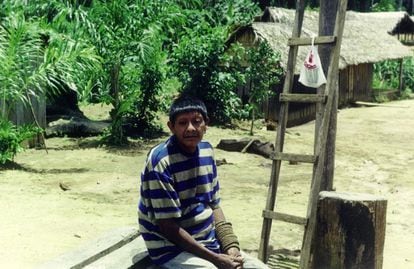Covid-19 takes the life of the last male from Brazil’s indigenous Juma tribe
The elder Aruká, who died last week in a hospital in the upper Amazon River basin, leaves behind three daughters who are now the only survivors of a group that counted on thousands of members just three centuries ago

/cloudfront-eu-central-1.images.arcpublishing.com/prisa/DY6DSTLZRNAPPJN53YMGVBOTJM.jpg)
Aruká Juma, a native Brazilian, was aged between 86 and 90 when he died from complications caused by coronavirus on Wednesday in an intensive care unit (ICU) in a hospital in Porto Velho, a city located in the upper Amazon River basin, and 120 kilometers by road and two hours by boat from his village.
His death, just like the 1,150 other Covid-19 fatalities registered that day across Brazil, was a tragedy for his next of kin. But Aruká was also the last male from the Juma people, a living memory of ancestral wisdom and a survivor of an attempt to wipe out his kind. The three daughters he leaves behind are now the only ones left from a people who counted on between 12,000 and 15,000 members in the 18th century.
Aruká was the last Juma man who had knowledge of the ways of hunting, the artisan ways of his peopleAnthropologist Edmundo Peggion
Acute respiratory failure combined with an infection meant that the senior did not survive the illness, according to digital daily Amazonia Real. As a youngster, he and six other Jumas survived a massacre that was ordered by traders interested in the rubber and chestnuts from his land, according to the detailed information from the Social-Environmental Institute about every one of the hundreds of ethnic groups in Brazil. Hunted down as if they were wild animals, around 60 of the indigenous peoples were killed. It was the last mass-extermination attempt that was suffered by the tribe, which was described by chroniclers as cannibals, perverse and ferocious.
Aruká's case illustrates how the coronavirus pandemic has affected the indigenous peoples who live in the villages of Brazil, which is the second-worst country in terms of the global impact of the pandemic. Three figures sum up the national drama: 242,000 dead, nearly 10 million infections and a 14% unemployment rate. Among the indigenous peoples who live in villages – a small minority that is particularly vulnerable in this vast territory – Covid-19 has killed 567 people. The life of this Juma offers, what’s more, a look at the history behind these communities that have been decimated since Portuguese colonization and that are essential for the conservation of the Amazon, the biggest tropical jungle in the world. The tribes are key, as such, in the fight to slow down climate change.
Anthropologist Edmundo Peggion came to know the last Juma in the 1990s. “Aruká was the last Juma man who had knowledge of the ways of hunting, the artisan ways of his people,” explains the professor from the Paulista State University (Unesp) via telephone. “There is a consensus in the region, among the Kagwahiva indigenous people, of their importance for the collective memory.” Kagwahiva is the linguistic group to which the Juma belong. “He was recognized as an amóe, a title of respect,” Peggion explains, in reference to a word meaning “grandfather.”
As well as the long-term threats facing Brazil’s indigenous peoples, such as gold miners and illegal loggers, they have also been facing the coronavirus pandemic and Jair Bolsonaro’s handling of the health crisis – the Brazilian president is anti-vaccine, has played down the severity of Covid-19 and has also trampled on the rights of indigenous peoples.
The main associations protecting Brazilian natives have directly blamed the government for Aruká‘s death. “Once again, the Brazilian government has acted with a degree of criminal negligence and incompetence,” they charged in a statement. “The government murdered him.”

The epidemic is spreading fast via the rivers of the Amazon, and the invaders of lands are a source of infection. While vaccines are arriving in remote indigenous villages, there is mistrust of health workers. And the lack of vaccine supply is threatening the campaign in all of Brazil – the program had to be suspended in Rio de Janeiro last week.
Aruká had to be taken to hospital in January and intubated. He became one of the Brazilians to be given what the country’s Health Ministry describes as early treatment, using drugs such as chloroquine – a medication whose efficiency against Covid-19 has not been scientifically proven, and whose usage has been turned into government policy by Bolsonaro.
The death of the indigenous senior “is a devastating loss,” says Edson Carvalho, from the NGO Kanindé. “The history of his life was and will continue to be a symbol of the tremendous fight waged by the Juma people,” he adds, speaking via telephone from Porto Velho, the city where Aruká died.
He will be buried in his village, which is where he was when he noticed the first coronavirus symptoms in January. It’s a place far from any city, a 38,000-hectare indigenous reserve that was created after a long and tough battle that involved years of administrative procedures. The Brazilian authorities were unconvinced as to whether this territory, and its handful of residents, was worthy of the legal protection needed to impede the exploitation of its resources.
After another battle with the authorities, Aruká managed to return to the lands where he grew up and where his ancestors lived for centuries
Before this was achieved, at the end of the 1990s the last Juma peoples were removed from their land by the authorities. Aruká, his three daughters, a brother-in-law and his wife were moved against their will to the domain of the Uru-Eu-Wau-Wau, explains Peggion, who had close contact with both groups at the time. There the daughters married men from the other tribe, with whom the Juma had a common language. Abandoning their habitat “had a huge impact in the life of all of the Juma,” the anthropologist explains, adding that the older couple died shortly after the relocation. “In those years, outside of his territory, Aruká was very depressed, he really missed his territory,” the researcher explains.
After another battle with the authorities, Aruká managed to return to the lands where he grew up and where his ancestors lived for centuries. He was accompanied by his daughters (Jumas), their husbands (Uru-Eu-Wau-Wau) and the children of the three couples. The Kanindé NGO claims that the daughters are the last of the line, given that it is the father who passes down the ethnicity. The firstborn, Borehá, is the new chief of the decimated group.
Faithful to his campaign promise, Bolsonaro has failed to give legal protection to a single extra square inch of indigenous land during the two years he has held the presidency. The cases that are being processed have been frozen while the number of Amazon inspectors – the bodies that work to take care of the environment and the indigenous peoples that have protected it for countless generations – is being reduced.
English version by Simon Hunter.
/cloudfront-eu-central-1.images.arcpublishing.com/prisa/BJVT4OQJ5LZD6OTLBWBDC6FIKA.jpg)
/cloudfront-eu-central-1.images.arcpublishing.com/prisa/X43SMWPUNJFGXLGZSE7WJ5V6KM.jpg)










































